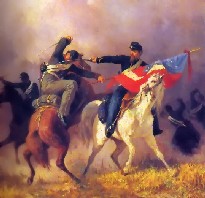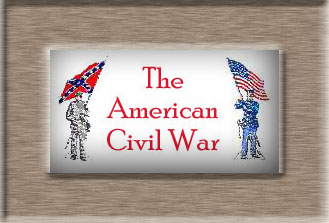


|

BIBLIOGRAPHY
Andrews, J. Cutler, The South Reports the Civil War. Princeton, N.J.: Princeton University Press, 1970. Bates, Samuel P., History of Pennsylvania Volunteers, 1861-5. Harrisburg: B. Singerly, state printer, 1869-1871. Bils, Mark, "Tariff Protection and Production in the Early U.S. Cotton Textile Industry," Journal of Economic History, 44, Dec. 1984, pp.1033-45. Blair, William, Virginia's Private War: Feeding Body and Soul in the Confederacy, 1861-1865. New York: Oxford University Press, 1998. --------------, and William Pencak, eds., Making and Remaking Pennsylvania's Civil War. University Park, Pa.: Pennsylvania State University Press, 2001. Bragg, William Harris, Joe Brown's Army. The Georgia State Line, 1862-1865. Macon, Ga,: Mercer Univ. Press, 1987. Craven Avery O., "The Price of Union," Journal of Southern History, XVIII, Feb. 1952, pp.3-19. Davis, David Brion, Slavery and Human Progress. New York: Oxford University Press, 1987. Elliot, Jonathan, The Debates of the Several State Conventions on the Adoption of the Federal Constitution. Philadelphia: J.B. Lippincott & Co., 1876. Emerson, William E., "Leadership and Civil War Desertion in the Twenty-fourth and Twenty-fifth Regiments of North Carolina Troops," Southern Historian 18 (fall 1997), pp. 17-33. Fogel, Robert William, and Engerman, Stanley L., Time on the Cross: The Economics of American Negro Slavery. Boston: Little, Brown and Company, 1974. -------------, "Philanthropy at Bargain Prices: Notes on the Economics of Gradual Emancipation," Journal of Legal Studies, III, 1974, pp.380-1. Fuller, J.F.C., "The Place of the American Civil War in the Evolution of War," Army Quarterly, XXVI, 1933, pp.316-325. Gallagher, Gary W., The Confederate War. Boston: Harvard University Press, 1997. Geary, James W., We Need Men: The Union Draft in the Civil War. DeKalb, Ill.: Northern Illinois University Press, 1991. Genovese, Eugene, Roll, Jordan, Roll: The World the Slaves Made. New York: Pantheon Books, 1974. Giuffre, Katherine A., "First in Flight: Desertion as Politics in the North Carolina Confederate Army," Social Science History 21, no.2 (summer 1997), pp. 245-63. Hacker, Louis M., The Triumph of American Capitalism. N.Y.: Simon & Schuster, 1940. Hamilton, Alexander, "Report on the Subject of Manufactures," in F.W. Taussig, State Papers and Speeches on the Tariff. Cambridge, Mass.: Harvard University Press, 1892. The report is also online, in exerpts, at http://members.tripod.com/~american_almanac/hammanuf.htm Hammond, Bray, Banks and Politics in America From the Revolution to the Civil War. Princeton, N.J.: Princeton University Press, 1957. Hancock, Harold B., Delaware During the Civil War: A Political History. Wilmington, Historical Society of Delaware, 1961. Harper, Douglas R., "If Thee Must Fight:" A Civil War History of Chester County, Pa. West Chester, Pa.: Chester County Historical Society, 1990. ------------------, West Chester to 1865: That Elegant & Notorious Place. West Chester, Pa.: Chester County Historical Society, 1999. Hay, John, and John G. Nicolay, Letters and State Papers of Abraham Lincoln, 1894. Hummel, Jeffrey Rogers, Emancipating Slaves, Enslaving Free Men. Chicago: Open Court, 1996. Jacoby, Tamar, Someone Else's House: America's Unfinished Struggle for Integration. Basic Books, 2000. Klein, Herbert S., The Atlantic Slave Trade. Cambridge Univ. Press, 1999. Litwack, Leon F., North of Slavery. The Negro in the Free States, 1790-1860. Chicago: Univ. of Chicago Press, 1961. Lonn, Ella, Desertion During the Civil War. Gloucester, Mass.: American Historical Association, 1928. Reprint 1998 by Bison Books. McManus, Edgar J., Black Bondage in the North. Syracuse, N.Y.: Syracuse Univ. Press, 1973. -------------, A History of Negro Slavery in New York. Syracuse, N.Y.: Syracuse Univ. Press, 1966. McPherson, James M., Drawn with the Sword: Reflections on the American Civil War. Oxford University Press, 1996. -------------, What They Fought For, 1861-1865. Baton Rouge: Louisiana State University Press, 1994. -------------, introduction to Writing the Civil War: The Quest to Understand, McPherson and William J. Cooper, eds. University of South Carolina Press, 1998. McDonald, Forrest, States Rights and the Union 1776-1876. University Press of Kansas, 2000. -------------, Novus Ordo Seclorum. University Press of Kansas, 1985. Mitchell, Reid, The Vacant Chair: the Northern Soldier Leaves Home. New York: Oxford University Press, 1993. Moore, Albert Burton, Conscription and Conflict in the Confederacy. New York: MacMillan, 1924; reprint 1963 (with introduction by William Garrett Piston), University of South Carolina. Murdock, Eugene C., Patriotism Limited 1862-1865: The Civil War Draft & Bounty System, Kent State U. Press, 1967. -----------------, ed., One Million Men: The Civil War Draft in the North, Champaign: University of Illinois, 1971. Nash, Gary B., Race and Revolution. Madison, Wisc.: Madison House, 1990. ------------, and Jean R. Soderlund, Freedom by Degrees: Emancipation in Pennsylvania and Its Aftermath. N.Y.: Oxford University Press, 1991. Nichols, Roy Franklin, The Disruption of the American Democracy. N.Y.: The MacMillan Co., 1948. O'Connor, Thomas H., Lords of the Loom, the Cotton Whigs and the Coming of the Civil War. N.Y.: Scribner's, 1968. Paquette, Robert Louis, and Ferleger, Louis A., eds., Slavery, Secession, and Southern History. Charlottesville: University of Virginia Press, 2000. Rable, George C., The Confederate Republic: A Revolution Against Politics. Chapel Hill: University of North Carolina Press, 1994. Reed, H. Clay, "Lincoln's Compensated Emancipation Plan," in Delaware Notes, 7 (1931). Roark, James L., "Behind the Lines: Confederate Economy and Society," in James M. McPherson and William J. Cooper, eds., Writing the Civil War: The Quest to Understand. University of South Carolina Press, 1998. Ruffner, Kevin Conley, "Civil War Desertion from a Black Belt Regiment: An Examination of the 44th Virginia Infantry," in Edward L. Ayers and John C. Willis, eds., The Edge of the South: Life in Nineteenth-Century Virginia. Charlottesville: University of Virginia, 1991. --------------------, Maryland's Blue & Gray: A Border State's Union and Confederate Junior Officer Corps. Baton Rouge, La.: Louisiana State University Press, 1997. Scott, Robert N., ed., The War of the Rebellion: A Compilation of the Official Records of the Union and Confederate Armies, 127 volumes, Washington, D.C., Government Printing Office, 1880-1909. Shankman, Arnold M., The Pennsylvania Anti-War Movement 1861-1865. Cranbury, N.J.: Associated University Presses, 1980. Shannon, Fred Albert, The Organization and Administration of the Union Army, 1861-65, Cleveland: The Arthur H. Clark Co., 1928. Silver, David M., Lincoln's Supreme Court, Univ. of Ill. Press, 1957. Stampp, Kenneth M., And the War Came. The North and the Secession Crisis, 1860-1861. Baton Rouge, La.: Louisiana State Univ. Press, 1970. Summers, Mark W., The Plundering Generation: Corruption and the Crisis of the Union, 1849-1861. N.Y.: Oxford University Press, 1987. Taussig, F.W., The Tariff History of the United States. New York, 1893. Terrell, W.H.H., Indiana in the War of the Rebellion, official report of the state adjutant general, Indianapolis, 1869. Thomas, Emory, The Confederate Nation, 1861-65. New York: Harper & Row, 1979. Trefousse, Hans L., Thaddeus Stevens: Nineteenth-Century Egalitarian. Mechanicsburg, Pa.: Stackpole Books, 2000. Van Metre, T.W., "The Coastwise Trade of the Atlantic Coast, 1789-1860," and "Early Development of the Internal Commerce of the United States, 1789-1830," both in History of Domestic and Foreign Commerce of the United States, Vol. I, Washington, D.C., The Carnegie Institution of Washington, 1915. Vandiver, Frank E., "The Confederacy and the American Tradition," Journal of Southern History, XXVIII, Aug. 1962, pp.277-286. Wallace, Anthony F.C., Rockdale: The Growth of an American Village in the Early Industrial Revolution. N.Y.: W.W. Norton & Co., 1972. Watkins, Sam R., Co Aych. N.Y.: Macmillan, 1962. Weigley, Russell F., ed., Philadelphia: A 300-Year History. N.Y.: W.W. Norton & Co., 1982. Weitz, Mark A., A Higher Duty : Desertion Among Georgia Troops During the Civil War. University of Nebraska Press, 2000. Williams, William H., Slavery and Freedom in Delaware, 1639-1865, Wilmington: Scholarly Resources, 1996. Woodward, C. Vann, The Burden of Southern History. 3rd edition. Louisiana State University Press, 1993. Wright, William C., The Secession Movement in the Middle Atlantic States. Cranbury, N.J.: Associated University Presses, 1973.
|
| �2002Douglas Harper | "When misunderstanding serves others as an advantage, one is helpless to make oneself understood." -Lionel Trilling |